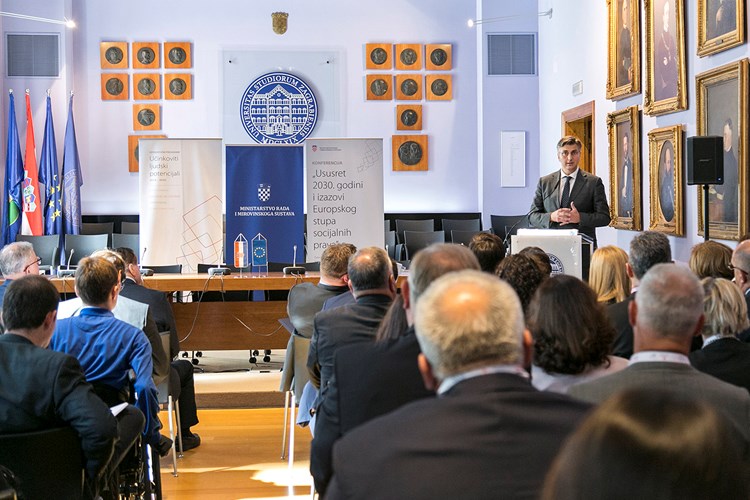- Published: 27.09.2018.
PM and Commissioner Thyssen address European Pillar of Social Rights conference
Addressing a conference on the Agenda 2030 and challenges of the European Pillar of Social Rights, which was also attended by European Commissioner for Employment, Social Affairs, Skills and Labour Mobility Marianne Thyssen, Prime Minister Andrej Plenkovic said that the discussion on social topics, demography, social dialogue and employment can contribute to efficient use of the European Social Fund to reduce inequalities in Croatian society and to greater social inclusion.
Addressing reporters, Plenkovic said that they had shown everything that they are trying to achieve in synergy, including the education reform as one of the key structural reforms.
Minister of Labour and Pension System Marko Pavic said that the European Pillar of Social Rights recommends 20 principles and represents a set of values that the European Union wishes to finance. He recalled that Croatia has a record low level of unemployment with 130,000 jobless persons or 7.9%, and compared to 2013 the rate of youth unemployment has been halved.
Unions and employers with agreements worth millions
Pavic underscored that HRK 13 billion was foreseen from the European Social Fund to improve social inclusion and to resolve social problems and recalled that the "Make a Wish" employment project was valued at HRK 1 billion envisaging employment for 7,000 women and now Austria and Ireland want to introduce it as an example of good practice.
Today four grand scheme agreements will be signed whereby we wish to promote values at the European level, he said.
New agreements in the "Make a Wish" project will be signed as 58% of unemployed persons in Croatia are women. New agreements with kindergartens too will be signed. The thing that makes us the happiest is the agreement on social inclusion of disabled persons and marginalised groups through sports and we will increase funding for that by HRK 100 million, Pavic said.
He also announced strengthening social dialogue, noting that three union federations and the employers' association would be given projects worth millions to strengthen their capacities as social partners.
Asked about labour shortages, Pavic said that that was the biggest problem facing employers, but most European countries have similar problems. Adult education and improving their skills will be one of the priorities during Croatia's chairmanship of the European Union in 2020. Short-term solutions in education and retraining through the Croatian Employment Service (HZZ) will satisfy labour market needs while the comprehensive curricular reform is a long-term solution, he said, adding that HRK 3.5 billion had been secured for that, HRK 400 million will be allocated for reforms in vocational education.
Negotiations with the unions in public and state services will continue next week and I believe that we will soon reach an agreement because the only issue is the base wage, Christmas and holiday bonuses, Pavic told reporters.
Referring to the pension reform Pavic said that the unions had presented a compromise proposal and that he would once again call them to the negotiation table.
Thyssen: Preparations for digitisation and technological revolution underway
Commissioner Thyssen underscored that the EU has turned a new chapter because following the crisis, economic growth has returned. Employment has increased and 239 million Europeans are employed.
Croatia too is heading toward growth. Never before has there been such a big drop in unemployment however, the fruits of those changes are still not accessible to everyone and we have to work on that - and prepare for a new era of digitisation and technological revolution that is changing the world of employment and labour.
We have to work in more detail on improving skills and the main goal of the European Pillar of Social Rights is preparing people for those changes. One of the fundamental principles is to improve and advance the know-how and skills, life-long learning and further training.
We have begun working on bringing digitisation closer to our reality and we wish to create a platform for an economy that will not just create new jobs but will improve working conditions. We recommend that all workers enjoy the same protection and for all mothers and fathers to simply coordinate their working and family lives, Thyssen said.
Text: Hina
